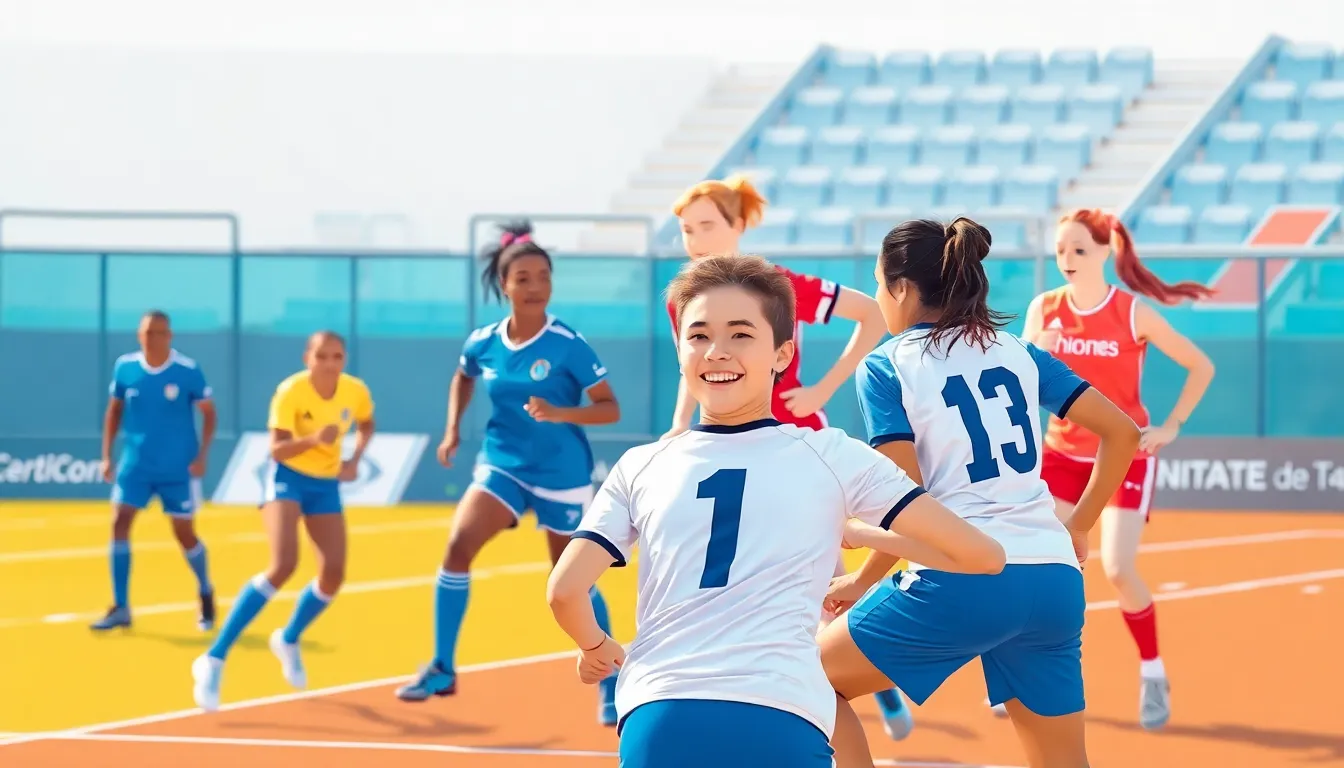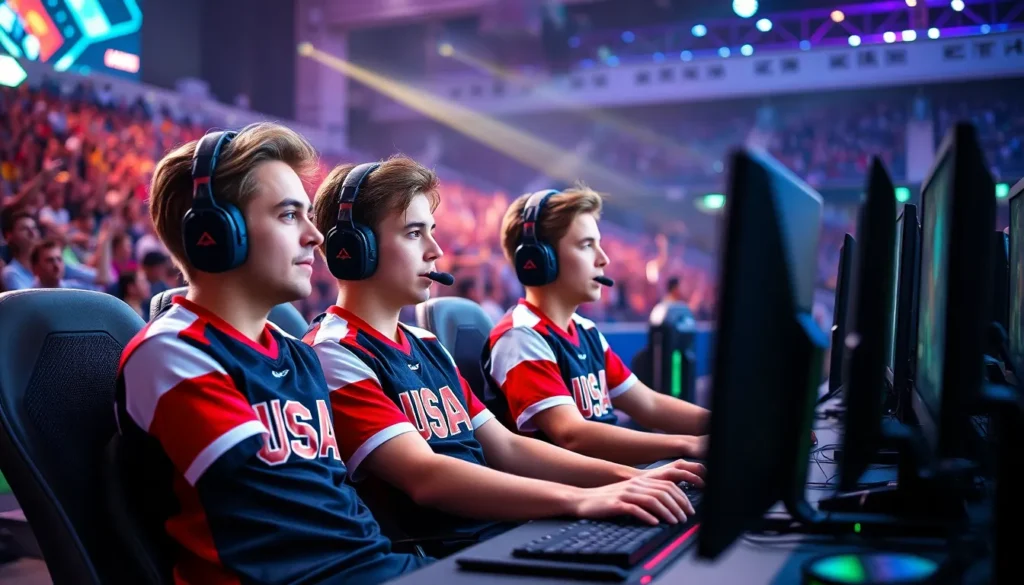In the age of high-speed internet and virtual arenas, the debate over whether video games qualify as a sport is heating up. Picture this: gamers, clad in their favorite hoodies, wielding controllers like swords, and competing for glory while snacking on pizza rolls. It’s not just a pastime; it’s a battle of wits and reflexes that rivals traditional sports in intensity and strategy.
As esports continue to fill stadiums and rack up millions in sponsorships, it’s time to ask the big question: Are these digital gladiators deserving of the same recognition as athletes on the field? With the world watching, the line between gaming and traditional sports blurs. So grab your controller and settle in; this exploration of the gaming arena might just change the way you view sports forever.
Is Video Games A Sport
Video games encompass a range of interactive entertainment formats, with esports being a prominent category. Esports involve organized multiplayer video game competitions, especially between professional players. Competitive gaming mirrors traditional sports through teamwork, strategy, and skill, blurring the line between the two.
Athletic prowess manifests in the form of quick reflexes, strategic thinking, and stamina during lengthy competitions. Gamers often undergo rigorous training regimes similar to athletes in physical sports. Competition exists not only among players but also between teams, fostering a spirited environment akin to that of traditional sports leagues.
The infrastructure supporting esports parallels established sports, with dedicated arenas simulating physical sporting venues. Viewership statistics highlight significant interest, with millions tuning in to watch tournaments via platforms like Twitch and YouTube. Sponsorship deals rival those in conventional athletics, indicating a robust market investment.
Recognition for esports grows as prestigious universities now offer scholarships for aspiring players. Major sporting organizations increasingly show interest in esports, further legitimizing it as a competitive discipline. The International Olympic Committee has even explored including esports in future Olympic events, reflecting its integration into the broader sports culture.
Cultural perceptions are shifting, with growing acceptance of video games as a sport. This transition supports the notion that competitiveness and skill define sports, regardless of the medium. As definitions evolve, the distinction between video gaming and traditional sports continues to fade, inviting further exploration into this dynamic realm.
Defining Sports

Understanding what defines sports requires examining key characteristics and criteria. Various elements contribute to the classification of activities as sports.
Traditional Sports Characteristics
Traditional sports encompass physical exertion, competition, and skill. Competitors engage in organized games that generally involve teamwork and strategy. Often, traditional sports occur in a structured environment, such as fields or courts, with established rules. Players display athletic abilities, including agility and endurance, which contribute to their performance. Many sports emphasize fair play, with officials or referees ensuring adherence to rules. This foundation allows sports to foster community and unity among participants and fans.
Criteria for Classifying Sports
Several criteria help classify sports beyond physicality. Recognizable skill and competitiveness play significant roles in this classification. Activities that provide a structured environment and establish clear objectives tend to qualify. Additionally, the presence of an audience enhances the sporting experience, whether through live viewership or broadcasts. Furthermore, some sports have governing bodies that oversee competitions and facilitate growth. As definitions evolve, many consider these factors vital in distinguishing between sports and non-sporting activities.
The Case for Video Games as a Sport
Esports increasingly demonstrate characteristics that align with traditional sports. Competitors exhibit significant physical skill and mental acuity, elevating gaming to a level of athleticism.
Physical Skill and Coordination
Competitors in esports often showcase impressive physical skill and coordination. Quick reflexes are essential for executing strategies and responding to in-game events. Players continuously refine their hand-eye coordination through practice and gameplay, mirroring the agility displayed in physical sports. Endurance also plays a vital role; long gaming sessions require sustained focus and energy. The demand for precision movements in shooting and fighting games illustrates the athletic nature of gaming. Many players undergo structured training regimens, emphasizing physical fitness alongside gameplay skills.
Mental Skill and Strategy
Mental skill and strategic thinking underpin success in esports. Players analyze opponents’ behaviors and adapt tactics in real time, a hallmark of competitive sports. Strategic planning often involves coordination with teammates to ensure effective teamwork and communication. Decision-making speed and accuracy can determine the outcome of matches, serving as a testament to players’ competitive intelligence. Gamers engage in extensive analysis of previous matches, allowing for continuous improvement and adaptation. This strategic mindset reflects the cerebral demands found in traditional sports, reinforcing the classification of esports as a legitimate form of competition.
The Case Against Video Games as a Sport
Some argue that video games do not qualify as a sport due to specific characteristics that differentiate them from traditional athletic pursuits.
Lack of Physical Activity
Non-physical elements emerge as a significant argument against classifying video games as a sport. Traditional sports demand rigorous physical exertion, while many video games primarily involve mental engagement and fine motor skills. Players often sit for extended periods, lacking the aerobic activity typical of sports. For instance, athletes frequently engage in cardio training to enhance endurance and stamina, which doesn’t parallel the sedentary nature of gaming. Critics point out that without substantial physical activity, video gaming struggles to fulfill a core requirement often associated with sports.
Cultural Perceptions and Stigma
Cultural attitudes further complicate the classification of video gaming as a sport. Many still view gaming as a pastime rather than a competitive endeavor deserving of athletic recognition. Stigma surrounding gamers persists, often painting them as socially withdrawn, lacking the physicality of traditional athletes. Public perception greatly influences this view, as media portrayals often focus on negative stereotypes. As a result, mainstream recognition of esports remains limited, impacting its acceptance in sports culture. Acceptance and respect come more easily for activities tied closely to observable physical athleticism, leaving esports grappling with skepticism amid a rapidly evolving cultural landscape.
Examples of Competitive Video Gaming
Competitive video gaming, or esports, showcases intense competition similar to traditional sports. Events attract participants and audiences worldwide, emphasizing skill and strategy.
Esports Tournaments
Esports tournaments draw large crowds and offer substantial prize pools. Events like The International for Dota 2 and the League of Legends World Championship feature millions in earnings, demonstrating the financial stakes involved. Teams from different regions compete, highlighting not only individual skill but also teamwork in a structured environment. Livestreaming on platforms such as Twitch enhances visibility, allowing real-time viewer engagement. Major publishers often sponsor these tournaments, boosting their legitimacy and reach.
Notable Players and Teams
Many players and teams have gained recognition in the esports arena. Organizations such as Team Liquid and Fnatic consistently showcase top-tier talent, setting benchmarks for performance. Players like Johan “N0tail” Sundstein and Lee “Faker” Sang-hyeok achieve celebrity status, symbolizing excellence in their respective games. These individuals undergo rigorous training regimens, often practicing for hours daily. Their success reflects the blend of skill, strategy, and dedication crucial in the competitive gaming landscape.
Conclusion
The debate over whether video games qualify as a sport continues to gain traction. With esports showcasing intense competition and requiring significant skill and strategy, many are starting to view gamers as athletes. As the landscape evolves and acceptance grows, it’s clear that the lines between traditional sports and gaming are blurring.
Recognizing esports as a legitimate form of competition may just be the next step in the ongoing evolution of sports culture. As gaming becomes more integrated into mainstream society, the acknowledgment of its competitive nature and the athleticism involved will likely reshape perceptions for years to come.

